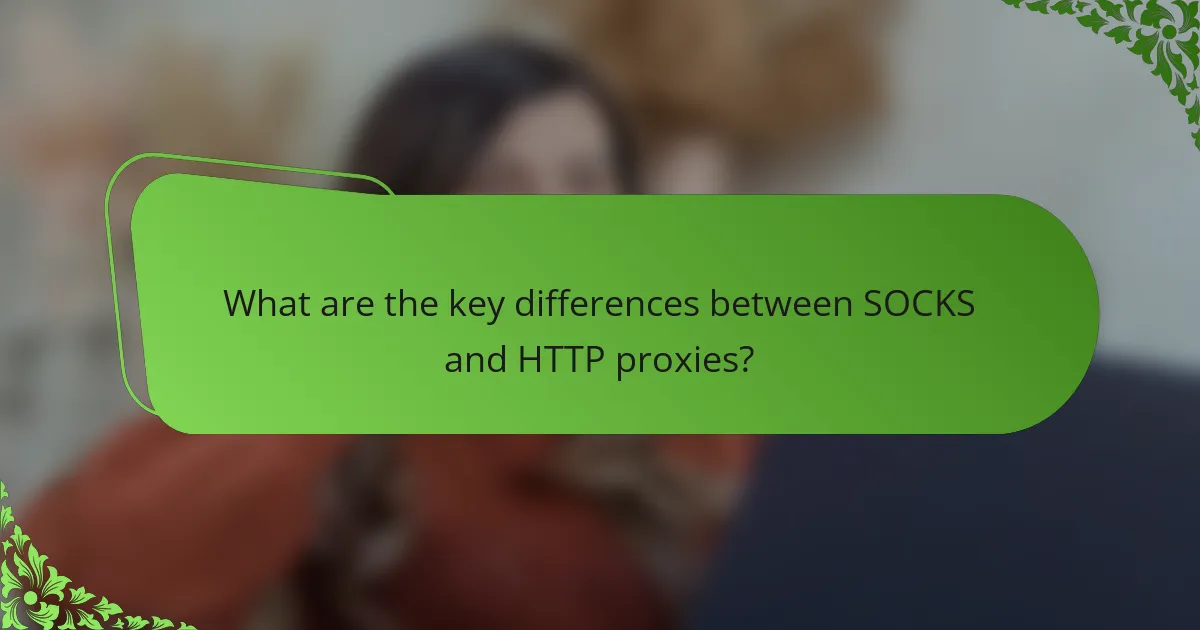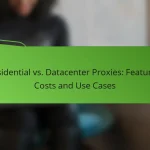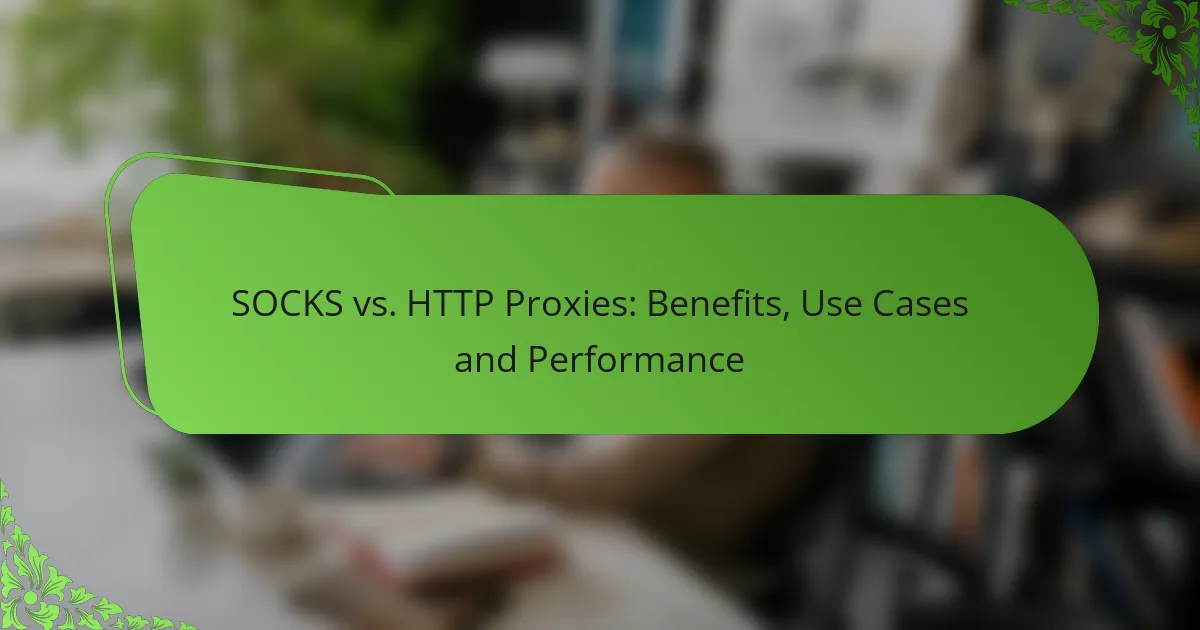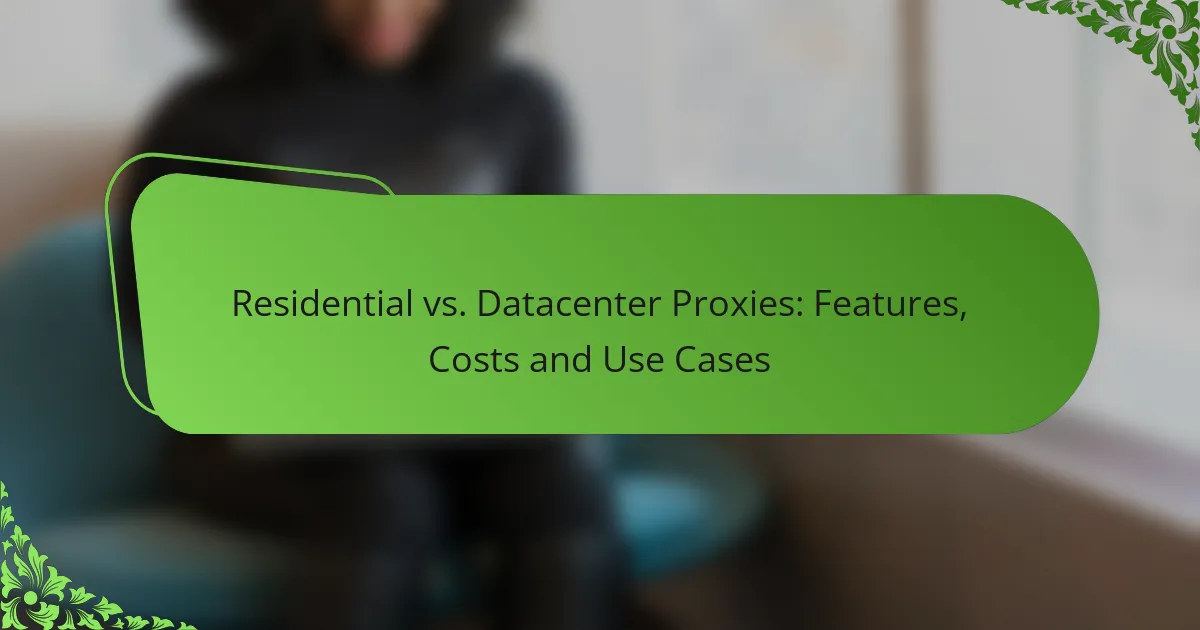When choosing between SOCKS and HTTP proxies, it’s essential to understand their distinct benefits and use cases. SOCKS proxies excel in providing enhanced anonymity and versatility, making them ideal for activities like torrenting and accessing geo-restricted content. In contrast, HTTP proxies are favored for their ease of integration with web applications and cost-effectiveness, particularly in web scraping and content filtering. Each type of proxy serves unique purposes, catering to different online needs and performance requirements.

What are the benefits of SOCKS proxies?
SOCKS proxies offer several advantages, including enhanced anonymity, support for various protocols, improved security features, and better performance for specific tasks. These benefits make SOCKS proxies a popular choice for users seeking privacy and efficiency in their online activities.
Enhanced anonymity
SOCKS proxies provide a higher level of anonymity compared to traditional HTTP proxies. By routing traffic through a SOCKS server, users can mask their IP addresses effectively, making it difficult for websites to track their online behavior. This is particularly beneficial for activities like web scraping or accessing geo-restricted content.
For maximum anonymity, choose a SOCKS proxy that does not log user activity. This ensures that your online actions remain private and untraceable.
Support for various protocols
One of the key benefits of SOCKS proxies is their ability to support multiple protocols, including TCP and UDP. This versatility allows users to route different types of traffic, such as web browsing, gaming, and file transfers, through the same proxy server.
In contrast, HTTP proxies are limited to handling only HTTP and HTTPS traffic. If you require a proxy for applications that use other protocols, a SOCKS proxy is the better choice.
Improved security features
SOCKS proxies often come with enhanced security features that protect user data during transmission. They can encrypt traffic between the client and the server, reducing the risk of interception by malicious actors.
When selecting a SOCKS proxy, look for options that offer strong encryption standards, such as AES-256. This ensures that your data remains secure while in transit.
Better performance for specific tasks
For tasks that require high bandwidth and low latency, such as streaming or online gaming, SOCKS proxies can provide better performance than standard HTTP proxies. They are designed to handle large amounts of data efficiently, making them suitable for demanding applications.
When using a SOCKS proxy for performance-sensitive tasks, consider the location of the proxy server. A server closer to your physical location can reduce latency and improve overall speed.

What are the benefits of HTTP proxies?
HTTP proxies offer several advantages, including ease of integration with web applications, content filtering, cost-effectiveness for web scraping, and quicker access to cached content. These benefits make them a popular choice for various online activities, enhancing both performance and security.
Easy integration with web applications
HTTP proxies are designed to work seamlessly with web applications, allowing developers to implement them without significant changes to existing infrastructure. They can be easily configured in most programming environments, enabling quick deployment and minimal disruption.
For example, many web frameworks support HTTP proxies natively, making it simple to route requests through a proxy server. This integration can enhance application performance and security with little additional effort.
Content filtering capabilities
One of the key benefits of HTTP proxies is their ability to filter content. Organizations can use these proxies to block access to specific websites or content types, ensuring compliance with company policies and enhancing productivity.
Content filtering can be tailored to meet specific needs, such as restricting access to social media or adult content. This capability is particularly useful in educational or corporate environments where controlling internet usage is essential.
Cost-effective for web scraping
HTTP proxies are often more affordable than other proxy types, making them a cost-effective solution for web scraping tasks. They allow users to gather data from multiple sources without incurring high costs associated with dedicated proxies.
By using a pool of HTTP proxies, scrapers can distribute requests across various IP addresses, reducing the risk of being blocked by target websites. This approach can significantly enhance the efficiency of data collection efforts.
Faster access to cached content
HTTP proxies can store cached versions of frequently accessed web pages, enabling faster retrieval of content. This caching mechanism reduces load times and improves the overall user experience, especially for repeated requests.
Organizations can benefit from this feature by reducing bandwidth usage and speeding up access to popular resources. Utilizing caching effectively can lead to substantial performance improvements for web applications and services.

When should I use SOCKS proxies?
SOCKS proxies are ideal for situations where anonymity and versatility are crucial, such as torrenting, accessing geo-restricted content, and secure online gaming. They facilitate a wide range of internet traffic, making them suitable for various applications beyond simple web browsing.
For torrenting and P2P sharing
Using SOCKS proxies for torrenting and P2P sharing enhances privacy by masking your IP address from other users. This is particularly important as it helps prevent potential legal issues associated with copyright infringement. Choose a SOCKS5 proxy for optimal performance, as it supports UDP, which is beneficial for faster data transfer.
When selecting a SOCKS proxy for torrenting, ensure it has a good reputation and offers high bandwidth. Avoid free proxies, as they may compromise your security and speed. A paid service typically provides better reliability and customer support.
When accessing geo-restricted content
SOCKS proxies are effective for bypassing geo-restrictions on streaming services and websites. By routing your connection through a server located in a different country, you can access content that may not be available in your region. This is especially useful for streaming platforms that enforce location-based restrictions.
To maximize your experience, select a SOCKS proxy server that is geographically close to the content you wish to access. This minimizes latency and improves streaming quality. Always check the proxy’s compatibility with the specific service you intend to use, as some platforms actively block known proxy IPs.
For secure online gaming
SOCKS proxies can enhance security during online gaming by hiding your IP address from potential attackers. This added layer of anonymity helps protect against DDoS attacks, which are common in competitive gaming environments. Using a SOCKS5 proxy can also reduce ping times when configured correctly.
When using a SOCKS proxy for gaming, ensure that it has low latency and high bandwidth to maintain a smooth gaming experience. Avoid proxies that introduce significant lag, as this can negatively impact your performance. Always test the proxy with your game before committing to it for long sessions.

When should I use HTTP proxies?
HTTP proxies are ideal for tasks that require web access without revealing your IP address. They are particularly useful for web scraping, bypassing content filters, and managing multiple accounts on various platforms.
For web scraping and data mining
HTTP proxies facilitate web scraping by allowing users to send requests to websites without exposing their original IP addresses. This is crucial for avoiding IP bans and ensuring consistent access to data.
When selecting an HTTP proxy for scraping, consider using rotating proxies that automatically change IP addresses after a set number of requests. This can help maintain anonymity and reduce the risk of detection.
When bypassing content filters
HTTP proxies can effectively bypass content filters imposed by organizations or governments. By routing your traffic through a proxy server, you can access restricted websites and services that may be blocked in your region.
It’s important to choose a reliable proxy service that offers a range of IP addresses to avoid detection. Additionally, ensure that the proxy complies with local laws regarding internet usage and data privacy.
For managing multiple accounts
Using HTTP proxies is essential when managing multiple accounts on platforms like social media or e-commerce sites. Each account can be assigned a different proxy to prevent the platform from flagging your activities as suspicious.
When doing this, opt for dedicated proxies to ensure that each account operates independently without interference. This approach minimizes the risk of account bans and enhances security.

How do SOCKS proxies perform compared to HTTP proxies?
SOCKS proxies generally offer better performance than HTTP proxies for specific use cases, particularly when handling various types of traffic. While HTTP proxies are optimized for web traffic, SOCKS proxies can manage a wider range of protocols, which can lead to improved efficiency in certain scenarios.
Latency and speed differences
Latency and speed can vary significantly between SOCKS and HTTP proxies. SOCKS proxies typically exhibit lower latency due to their ability to handle multiple types of traffic without the overhead associated with HTTP headers. In contrast, HTTP proxies may introduce additional delays because they must process web-specific requests and responses.
For instance, when streaming video or engaging in real-time gaming, SOCKS proxies may provide a smoother experience with minimal buffering, while HTTP proxies might struggle with speed due to their focus on web traffic alone.
Resource usage and efficiency
SOCKS proxies are often more resource-efficient than HTTP proxies, as they do not require extensive processing of web protocols. This efficiency allows SOCKS proxies to handle more simultaneous connections without a significant increase in resource consumption.
In environments where bandwidth is limited or where multiple users share a connection, using SOCKS proxies can help optimize resource allocation, leading to better overall performance compared to HTTP proxies.
Connection stability
Connection stability is another area where SOCKS proxies can outperform HTTP proxies. SOCKS proxies maintain persistent connections, which can reduce the likelihood of dropped connections during high-traffic periods or when handling large data transfers.
On the other hand, HTTP proxies may struggle with stability, especially under heavy load, as they can become overwhelmed by the volume of web requests. For users requiring consistent and reliable connections, SOCKS proxies are often the preferred choice.

What are the key differences between SOCKS and HTTP proxies?
SOCKS and HTTP proxies serve different purposes and operate in distinct ways. SOCKS proxies can handle any type of traffic, while HTTP proxies are specifically designed for web traffic, making them suitable for different use cases.
How SOCKS proxies work
SOCKS proxies function as intermediaries for various types of network traffic, including TCP and UDP. They establish a connection between the client and the server, allowing data to flow through the proxy without altering the content. This flexibility makes SOCKS proxies ideal for applications that require diverse protocols, such as torrenting or gaming.
When using a SOCKS proxy, the client sends requests to the proxy server, which then forwards them to the intended destination. The response from the destination server is sent back through the proxy, ensuring anonymity and security. SOCKS proxies can be either SOCKS4 or SOCKS5, with the latter offering enhanced features like authentication and UDP support.
How HTTP proxies work
HTTP proxies are specifically designed to handle web traffic, which means they work primarily with HTTP and HTTPS protocols. They act as intermediaries between the user’s browser and the web server, caching content and filtering requests to improve performance and security. This makes HTTP proxies suitable for tasks like web scraping or accessing geo-restricted content.
When a user makes a request through an HTTP proxy, the proxy server processes the request and retrieves the content from the web server. The content is then sent back to the user, often with additional features like caching to speed up subsequent requests. HTTP proxies can also modify requests and responses, which can be useful for content filtering or ad-blocking.
Benefits and use cases of SOCKS proxies
SOCKS proxies offer several advantages, including versatility and support for various protocols. They are particularly beneficial for users who need to bypass firewalls or access restricted content, as they can handle any type of traffic without restrictions. This makes SOCKS proxies popular among gamers, torrent users, and those who require secure connections for sensitive applications.
Common use cases for SOCKS proxies include accessing geo-blocked content, enhancing privacy while browsing, and improving connection speeds for online gaming. Their ability to support multiple protocols allows users to utilize them for a wide range of applications beyond just web browsing.
Benefits and use cases of HTTP proxies
HTTP proxies are particularly effective for web-related tasks due to their ability to cache content and filter requests. This can lead to faster load times and reduced bandwidth usage, making them ideal for businesses looking to optimize internet performance. Additionally, HTTP proxies can help enforce security policies by blocking access to certain websites or content types.
Typical use cases for HTTP proxies include web scraping, content filtering, and accessing region-restricted websites. They are often used in corporate environments to monitor employee internet usage and ensure compliance with company policies. Their focus on HTTP and HTTPS traffic makes them less versatile than SOCKS proxies but highly effective for specific web-related tasks.










